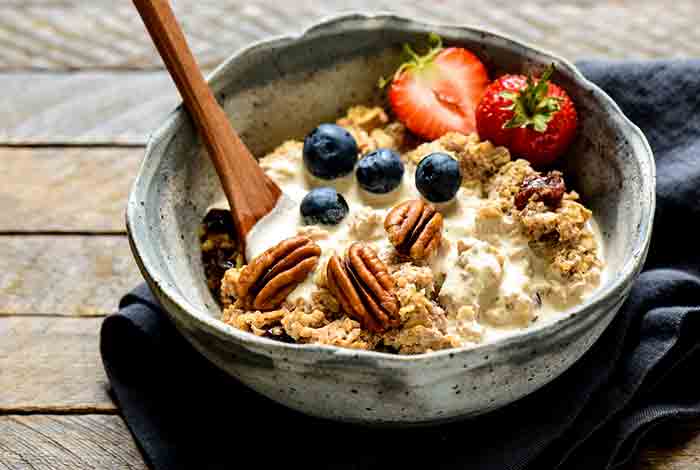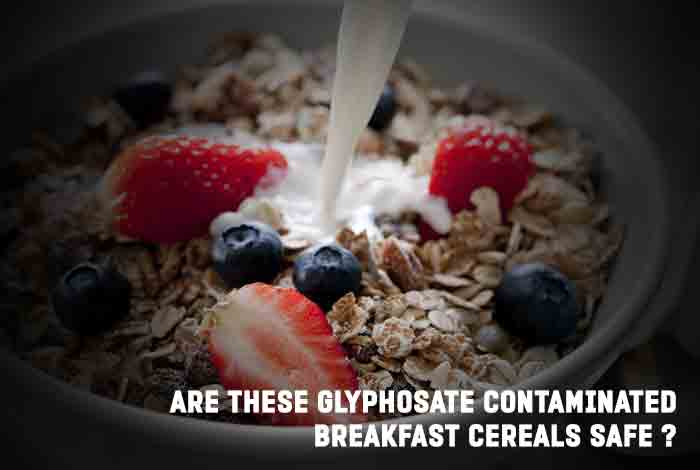
Weed-Killing Glyphosate Found In Popular Breakfast Cereals, According to Study

A new study has indicated the presence of glyphosate, a weed-killing chemical in various popular breakfast cereals. Several branded breakfast snacks and foods have potentially dangerous levels of glyphosate, which is quite an alarming situation. This weed-killing chemical has known to be associated with cancer and now is found in almost dozens of American oats-based cereals and snack bars, including the products that are specially marketed to adolescents and young children.
The eye-opening study was conducted by the U.S.-based Environmental Working Group (EWG). Popular oatmeal, granola bars, oat cereals and snack bars have a dangerous dose of the weed-killing chemical according to several laboratory tests conducted by EWG. These popular oat-based cereals have alarming levels of glyphosate, the popular herbicide, which is marketed by the name, Roundup. [1]
What Did the Study Reveal?
Tests revealed that glyphosate is present in 43 samples out of 45 oat-based products picked by the Environmental Working Group (EWG).
These breakthrough findings have surfaced just a few days after a high profile court case in which, the Roundup manufacturer, Monsanto was asked to pay 289 million USD to a man, named Dewayne Johnson, who claimed that this herbicide somehow contributed to his terminal cancer.
All, but two out of these 45 oat-based products tested by the EWG were found to have serious levels of glyphosate. The organization believes that these levels were much above than what is considered safe for human consumption; especially children.
Surprisingly, products manufactured by extremely popular brands like Cheerios, Quaker Oats, and Kellogg’s were among those that have highest levels of this weed-killing chemical.

Are These Glyphosate Contaminated Breakfast Cereals Safe?
Two samples of the Quaker Old Fashioned Oats had even more than 1,000 parts per billion (ppb) glyphosate when tested. The same company’s Steel Cut Oats and Dinosaur Eggs cereals had way more than 500 ppb.
EWG considers safe daily consumption or exposure to glyphosate to be maximum 160 ppb, although some scientists don’t agree with this figure too.
Ken Cook, EWG president, stated that he himself grew up eating Quaker Oats and Cheerios, but that was long before they were contaminated with glyphosate. He added that nobody really wants to have a weed-killing chemical for breakfast, and believes none should go through this too.
Glyphosate herbicides had been widely used in United Kingdom and the U.S. agriculture, and Monsanto’s Roundup is undoubtedly one of the most extensively used herbicides.
Environmentalists advocate that this weed-killer is associated with cancer development, but this claim is repeatedly denied by the glyphosate manufacturers. Moreover, the EU has already approved this chemical for use amid all this.
Scott Partridge, vice-president of Monsanto, explained that his company will now “vigorously defend” their product after paying 289 million USD as settlement to Johnson.
Mr. Johnson was diagnosed with non-Hodgkin’s lymphoma in back in the year 2014. He used glyphosate and an almost similar Monsanto product, known as Ranger Pro, in relatively large quantities. The court came to conclusion that Monsanto failed to inform their consumers that glyphosate is dangerous.
What Are The Concerned Authorities’ Take on Glyphosate In Foods?
Alexis Temkin, a toxicologist at EWG, reasoned that it is really painful that cereals that children like to have contain higher levels of glyphosate. He feels that parents should not have to worry about whether letting their children eat healthy oats could somehow increase their risk of developing cancer since the health effects of glyphosate exposure on humans are still uncertain.
In the year 2015, the World Health Organization (WHO) also classified weed-killing glyphosate as “probably carcinogenic.” [2]
However, in 2016, a joint report from the WHO and the United Nations (UN) stated that there is an undeniable evidence of a positive link between glyphosate exposure and increased risk of the non-Hodgkin’s lymphoma in some smaller studies, but the only large study found no significant evidence to reaffirming this association.
The report also concluded that glyphosate may not pose any carcinogenic risk, when consumed indirectly through foods.
The US Environmental Protection Agency (EPA) believes that the daily exposure of around 2 milligram of glyphosate is safe, which is way more than what EWP recommends.
The EWP went on accusing the EPA of possibly underestimating the adverse and risky outcomes of this chemical and re-iterated that children are at an increased risk, even with smaller intake, as they are more susceptible to carcinogens.
Quaker stands by the “safety and quality” of their popular breakfast products. A Quaker spokeswoman sated that by any means, they don’t add glyphosate during their highly controlled milling process. Glyphosate is, however, generally used by farmers, who use this herbicide before harvesting.
Once they receive the oats, Quaker ensures that the oats undergo a rigorous cleansing process for thorough cleaning. Any remaining levels of glyphosate is significantly below the prescribed limit of the safety standards that are pre-set by EPA and the European Commission as safe for human consumption.

Kellogg’s spokeswoman explained that their food is extremely safe. Kellogg’s aims at providing high-quality and safe foods, and they believe that this is how they have earned the trust of millions around the globe.
They strictly adhere to the standards for glyphosate’s safe levels as recommended by the EPA. The ingredients they purchase come from their suppliers, who have agricultural residues are well under the recommended limits.
General Mills, the manufacturer of Cheerios, also ensured that their products are safe for human consumption and undoubtedly, all their products meet the regulatory safety levels.
So, it’s totally up to you to reconsider the safety aspects of these popular go-to breakfast cereals that light up your morning nearly every day. In case, evidences fail to convince you and still find these herbicide-infused cereals risky for your kinds, it’s time to replace your breakfast cereals with something raw and natural.




